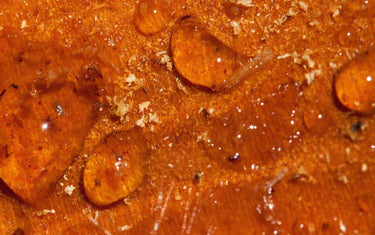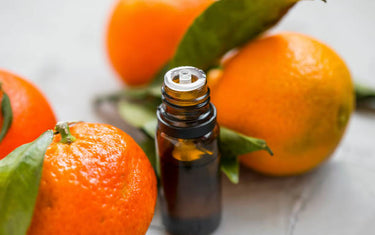5 min read / 24 January 2022 / Laura Garvin Gomez
Benefits and Uses of Benzoin Oil
Benzoin is a warming, stimulating oil with useful benefits for the cold weather.

This thick, mysterious oil was once worn as a perfume by Queen Elizabeth I – and is still known for its aromatic scent today.
The resin of the benzoin tree was used for thousands of years in the east as a medicine to heal and warm the body, particularly during the winter months.
These days, benzoin continues to be used as a warming agent as well as a digestive aid.

What is Benzoin Essential Oil?Benzoin is quite an unusual oil. Rather than being distilled or cold pressed like the majority of essential oils, it is collected from the balsamic resin of the benzoin tree, native to Thailand. The resin hardens upon exposure to air and sunlight and is then extracted via solvent extraction, where the excess material is dissolved to leave behind the essential oil. Also known by the botanical name Styrax Benzoe, the rich, honey-like smell of benzoin has made it an attractive oil scent-wise for centuries, despite its unique extraction method. Benzoin has an almost treacle-like consistency and must be heated before use to facilitate the flow of the oil. |
What are the benefits of Benzoin Essential Oil?
The mysterious nature of benzoin certainly does not lend itself to its benefits, and the oil has been a useful staple in aromatherapy research for a number of years across different applications.
Some of the best and most common benzoin essential oil benefits include:
- Improvements to circulation
- Removal of bad odours
- Aiding against respiratory conditions
- Facilitating regular urination
- Aiding digestion
- Improvements in skin health

Can benzoin essential oil improve circulation?
For centuries, benzoin oil has been thought to stimulate the heartbeat and get blood flowing quicker throughout the body.
This is one of the reasons why benzoin had such a religious significance across a number of faiths – by burning it at religious gatherings, people believed that it would create a mood of celebration due to these stimulating effects.
Many people now use benzoin oil in the winter months in order to improve circulation and warm themselves up.

Does benzoin oil help to remove bad odours?
A 2016 review suggests that benzoin has antibacterial properties, which may explain in part why it is so good at expelling unpleasant odours.
Its antibacterial qualities may allow it to kill the microbes responsible for the bad smells and freshen the air.
Another theory as to why benzoin is so effective at dispelling bad odours is that it owes this quality to derivatives of the benzene ring present within the chemical makeup of the oil.
The benzene ring, a hexagonal arrangement of six carbon atoms, is a key component of many organic compounds – in particular aromatic hydrocarbons.
Benzene’s aromatic properties give it a strong and pleasant odour that is able to inhibit less pleasant scents.
These odour-making and bacteria-fighting qualities make benzoin a great choice to use as an alternative to commercial deodorants.

Will benzoin oil help treat respiratory conditions?
Alongside its pleasant scent, benzoin has also been observed to have expectorant properties - commonly found in herbaceous essential oils like eucalyptus.
This means that the oil is able to aid the removal of excess phlegm and mucus from the respiratory system, helping to clear blocked airways and allowing for easier breathing.
It has also been suggested that benzoin produces a feeling of contentment in those that inhale it, equating to an almost sedative quality that allows for easier sleep amongst sufferers of respiratory conditions, as well as those recovering from a common cold or flu.

Using benzoin essential oil to facilitate regular urination
A lesser-known property of benzoin, and one that is still being explored, is its diuretic abilities.
Diuretics promote and facilitate frequent, healthy urination. This is beneficial for a number of reasons, including the regular removal of toxins from the body, the improvement of digestion, and the lowering of blood pressure.

Is benzoin oil good for digestion?
When massaged into the abdomen using a carrier oil, benzoin can produce powerful carminative and antiflatulent properties that can help facilitate a sound digestive system.
It can help to remove gases from the intestines as well as reduce inflammation while still maintaining calm in the digestive tract – a factor that is said to be owed to the oil’s relaxing qualities.
It is important to note that benzoin should not be ingested, and instead only applied topically after dilution to aid these symptoms.

Can I use benzoin essential oil for skin health?
The properties of benzoin lend themselves incredibly well to sound skin health and have even been studied in relation to the healing of wounds, eczema, and other skin conditions.
Benzoin’s anti-inflammatory and antibacterial qualities are said to help prevent redness and acne breakouts, while the oil’s status as an astringent makes it highly beneficial for tightening pores, reducing signs of aging, and improving elasticity.
Using a few drops of diluted benzoin as a skin toner can be a great way to promote healthier skin over time.

How to use Benzoin Essential Oil
Aromatherapy
The sweet, vanilla-like scent of benzoin has been renowned for centuries – and for good reason.
Diffusing a few drops of benzoin into your spaces can not only leave you with a comforting, complex scent but can also help warm you internally by naturally stimulating blood flow.
Using benzoin for aromatherapy is also a good option if you’re suffering from respiratory issues such as coughs or blocked airways, as the oil’s expectorant properties can help clear mucus and facilitate easier breathing.
You can also try adding some benzoin to your bath and letting the steam clear your respiratory tract to an even greater degree.
Massage
Combine a few drops of benzoin with a carrier oil and massage gently into the abdomen to help soothe and prevent digestive issues.
Benzoin’s anti-inflammatory, carminative and anti-flatulent properties make it the ideal natural remedy for those suffering, with the oil’s sedative qualities also contributing against discomfort and unease in the body.
Skincare
Benzoin’s antibacterial and astringent properties can be incredibly useful for application as a daily toner, cleanser, or spot-treating remedy.
Applying some benzoin to your skin with a carrier oil can help tighten the pores, encourage youthfulness, and leave skin looking brighter.
Remember to always conduct a patch test before using essential oils on the skin.

History of Benzoin Essential Oil
It is said that the first documented use of benzoin dates as far back as the sixth century AD.
Also known as “Eastern Frankincense” by some Arabic societies, benzoin was used in several religious ceremonies across Asia and was incredibly valuable as powdered incense.
It is said that benzoin was also used among Ancient Egyptians and traded to China along the Red Sea.
Benzoin was brought to Europe in the 15th century where it was then used extensively in perfumery.

There is still something mysterious and captivating about honey-scented benzoin, and it is easy to understand why it was once treated with such reverence.
Its rich, warming smell is enough reason alone to add it to your collection, and its internal benefits are all the more incentive.
|
Product Name |
100% Pure Benzoin Essential Oil |
| Botanical Name | Styrax Benzoe |
| Scent Type | Earthy |
| Benefits & Uses | Decongestant, Boosts Circulation, Stimulating |
| Suitable for Diffusers? | Yes, this benzoin essential oil is perfect for diffusers. |
| Suitable for Candles and Soaps? | Yes, this benzoin essential oil is perfect for candle and soap making. |
| Extraction Method | Steam Distillation |
| Bottle Type | Tamper proof and UV resistant |









